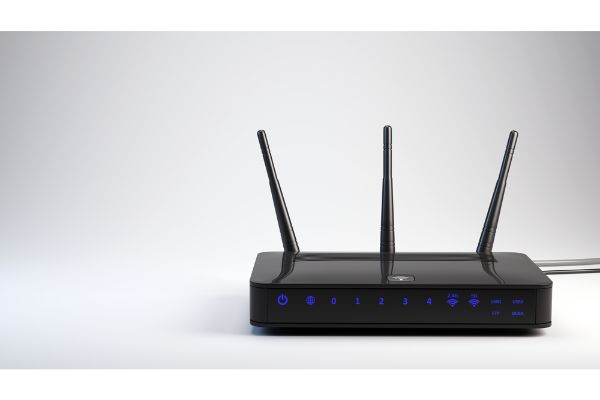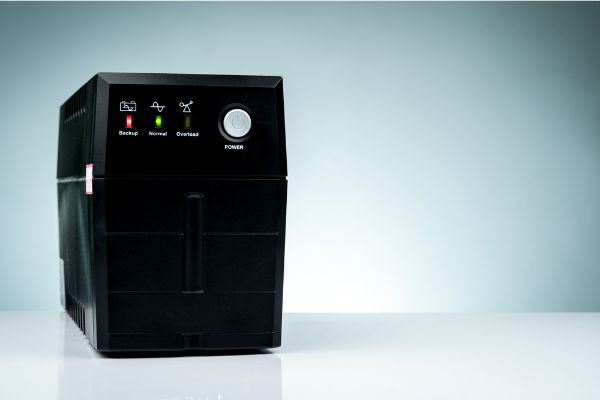Disclaimer: This post may contain affiliate links, meaning we get a small commission if you make a purchase through our links, at no cost to you. For more information, please visit our Disclaimer Page.
To get online in your home, you’re going to want a dedicated connection from an internet service provider in your area. The usual way to do this is to sign up for the internet speed package that you would like, and the provider’s technicians will come out to install some equipment in your home.
In many cases, the company will want to have at least a modem that they will place somewhere in the dwelling, but many ISPs will also provide their own routers for you to use. You can bring your own router, too, and set it up using a wizard. Whatever the case, the modem will receive a signal from your ISP that gives you the internet access at the speed you select. The router will take that signal and distribute it to other devices in your home, thus giving you Wi-Fi access.
With the right tools or setup, all of this is simple enough for the end user these days. However, sometimes power outages interrupt the service we get from our internet providers. For the most part, these things should resume automatically when the power turns back on. However, some users may wonder why their internet equipment isn’t working properly after a power outage occurs. We will get into this subject in our article.
Furthermore, we’ll talk about the possibility of such outages damaging a router, how you can fix this, and what ways might be available to you that could allow you to keep your internet going when other power turns off.
Table of Contents
Can a Power Outage Damage a Router or Modem?
Yes and no. A power outage should not be the cause of any damage to your router or modem by itself. However, high spikes in voltage often precede or immediately follow power outages. These changes are what can damage the equipment you use for your internet access.
When the surges occur, they send these changes in frequency down the line, and all of this could lead to your router or modem. Without protections, and if the spike is big enough, it could blow some of the hardware that is inside your equipment.
Some modern routers or modems come with protections that may guard against this type of thing. They cannot stop surges from happening, but they may include technology that is supposed to absorb some of that surge and siphon it off, thus leaving the router or modem intact.
It is also important to note that a potential power surge can cause problems with your modem or router, but that doesn’t mean it will cause an issue.
Knowing what level of surge is enough to cause some kind of damage is not easy for the end user to figure out, but your modern equipment might be able to take some kind of change in voltage without an issue.
Similarly, a sudden surge when the power is about to go out or come back on could damage any electrical device in your home, not just the internet access equipment that you use.
Why Is My Router or Modem Not Working After Power Outage?
Both routers and modems can be delicate pieces of technology, especially when it comes to maintaining their settings and restoring internet access after an outage.
Much of this hardware has some robustness to it, but spikes that are large enough can still punch through the shielding of the hardware to get at the more delicate pieces inside.
If your internet equipment isn’t working after an outage, you need to take a look at the modem and router as separate pieces first. This can help you narrow down which one might be at fault here.
While we can determine that the cause was a power spike, it isn’t as easy to figure out exactly why the equipment you use isn’t working as expected right away. It could be a temporary problem with the capacitors or settings not functioning properly, or it could be that the spike damaged your router or modem in ways that mean you might need to replace one or both of them.
Additionally, your electronics or appliances could experience problems from things other than outages. The most common issue that crops up is a spike in use across the board. You may notice this on either very hot or very cold days.
In such cases, more people are likely to start using furnaces or air conditioning to keep cool or warm. When this happens, the grid experiences an uptick in use, and it may be large enough to cause a sudden outage that is unrelated to a storm or downed line.
Although too much power when everything turns back on is the major issue here, too little power can be just as bad. When this happens, some of your appliances may not have enough juice to get things started. This is mostly a problem for larger, heavier things that rely on motors to run, so it should be less of an issue for routers or modems.
However, if your internet equipment is not working after an outage, it is possible that it isn’t receiving as much power as you think it is, and it could take a while for it to start up again.
What Are Some Ways I Can Fix This?
Now that you know some of the general ways that power outages keep routers or modems from turning back on, we can go through some of the things you might be able to do to fix the problem.
Our list may not be comprehensive, but it should include several troubleshooting tips that end users just like yourself can use to diagnose and fix problems with their internet equipment.
Before we begin, it is important to keep in mind that you may need a qualified internet technician to take a look at things. If you can’t get any of our fixes here to work, it may be best to have your service provider send someone to you.
Additionally, there is always a chance that you’ll need to replace some of your equipment. Regardless, here are some of the steps you can try to get your router or modem working again:
1. If you’ve unplugged your equipment following a power outage, just leave it unplugged and turned off for a while. When you notice that the power is back on, don’t try to power up your devices immediately. Try leaving them off and cooling for about 30 minutes first.
This gives things a chance to cool down if there was any kind of spike right before the outage, but it is even better for preventing the spike that can occur once the power comes back on.
If your power goes out, consider unplugging your devices, including disconnecting from main sources like wall outlets, and leave things that way.
2. Once you’ve done step one, plug things back in and power them up as you would normally. It could be that you’ve avoided the usual spike in voltage altogether.
3. If your router or modem devices still do not work, try letting them power up fully to see if any lights come on. If they do, but you still cannot get internet access, turn the devices off again for at least a full minute. Power them up once more to see if the problem goes away.
4. You can also do a full power cycle that involves completely unplugging the devices again. This allows the capacitors that might store a bit of electricity to let the charge out, thus resetting the devices completely.
5. Use ipconfig to ping your router within the Command Prompt program and see what kind of response you get. If you do not get one, you can try resetting the network bridge. You can do this by disconnecting the modem from the router.
How Can I Keep My Internet Connection During Power Outage?
The best way to keep your internet active during an outage is to have your devices on a separate or backup power supply. Many users call these uninterruptible power supplies. They are batteries that can keep things plugged into them turned on even when your main power goes out.
Having your router and modem plugged into something like this can allow it to stay on, letting the main power come back on gradually, hopefully sparing the devices from any kind of voltage spike in the process.
You may want to get one with its own surge protection that can deal with the spikes while it remains powered up. Although most power outages don’t last for too long, we recommend that you get a supply that should last for at least a few hours.
Conclusion
Power outages aren’t great for any appliances, but they might cause huge problems for your internet equipment, especially if there is a sudden surge once the company restores your power. With so many people using the internet for work from their homes these days, making sure your equipment can turn back on when you need it to function is vital.
There are a few things here that might get your router or modem working again after such an outage. To hedge against the problems power interruptions can cause, you should also look into backup power supplies with surge protection for routers and modems.


